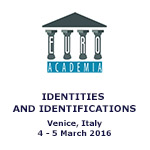Euroacademia Conferences
 Europe Inside-Out: Europe and Europeanness Exposed to Plural Observers (9th Edition) April 24 - 25, 2020
Europe Inside-Out: Europe and Europeanness Exposed to Plural Observers (9th Edition) April 24 - 25, 2020 Identities and Identifications: Politicized Uses of Collective Identities (9th Edition) June 12 - 13, 2020
Identities and Identifications: Politicized Uses of Collective Identities (9th Edition) June 12 - 13, 2020 8th Forum of Critical Studies: Asking Big Questions Again January 24 - 25, 2020
8th Forum of Critical Studies: Asking Big Questions Again January 24 - 25, 2020 Re-Inventing Eastern Europe (7th Edition) December 13 - 14, 2019
Re-Inventing Eastern Europe (7th Edition) December 13 - 14, 2019 The European Union and the Politicization of Europe (8th Edition) October 25 - 26, 2019
The European Union and the Politicization of Europe (8th Edition) October 25 - 26, 2019 Identities and Identifications: Politicized Uses of Collective Identities (8th Edition) June 28 - 29, 2019
Identities and Identifications: Politicized Uses of Collective Identities (8th Edition) June 28 - 29, 2019 The European Union and the Politicization of Europe (7th Edition) January 25 - 26, 2019
The European Union and the Politicization of Europe (7th Edition) January 25 - 26, 2019 7th Forum of Critical Studies: Asking Big Questions Again November 23 - 24, 2018
7th Forum of Critical Studies: Asking Big Questions Again November 23 - 24, 2018 Europe Inside-Out: Europe and Europeanness Exposed to Plural Observers (8th Edition) September 28 - 30, 2018
Europe Inside-Out: Europe and Europeanness Exposed to Plural Observers (8th Edition) September 28 - 30, 2018 Identities and Identifications: Politicized Uses of Collective Identities (7th Edition) June 14 - 15, 2018
Identities and Identifications: Politicized Uses of Collective Identities (7th Edition) June 14 - 15, 2018
Re-Imagining the Lost Identity: Walid Raad’s Archive Project – The Atlas Group
-
-

-
Presentation speakers
- Jong Chul Choi, Miyazaki International College, Japan
Abstract:
The contemporary political disasters, such as global terrorism and wars in the Middle East, involve issues of symbolic terrorization (Jean Baudrillard), erosion of the other’s bio-political identity (Giorgio Agamben), and hysteric antagonism against cultural (visual) intervention (Judith Butler). While these issues bring about a plight of the visual, they also call for a radical reconsideration in the mode of visual communication. Recently, such rethinking has been made by documentary’s new transformation into a hybrid politico-aesthetic form, whose subtle use of pictoriality, theatricality and visual simulacra appear to maximize the communicability of the socio-political agenda without diminishing aesthetic potentiality. Creatively playing on the limits of objectivity and authenticity – the very cliché of documentary per se – this ‘post-documentary’ practice offers a new possibility of political art that can compromise between documentary’s ethical validity and aesthetic creativity. A Lebanese-American artist Walid Raad, best known for his one-man project, “the Atlas Group,” provides a useful illustration of this new documentary trend. The Atlas Group is a fictional foundation and an archive project founded in 1999 and it has been presented in several high-profile art venues including the Moscow Biennial of Contemporary art (2011), Seoul International Biennial of Media Art (2010), Sydney Biennial (2006), Venice Biennial (2003), Documenta 11 (2002), and Whitney Biennial (2002). Although all the images in Raad’s archive seem to be a truthful documentation of Lebanon’s painful history, they are in fact a fictional construction created by Raad himself. In the fictions of the Atlas Group which shake up our customary view of the Arab world, the conventional divisions between the subject and the other, between fact and fiction, and between intellectuality and sensibility, become dissipated. At this moment, the other’s disastrous political reality produces various sensible echoes in which the invisible identity of the other finds its sensible body, phantasmagoric yet recognizable. With this echo of the sensible, I will argue, the singularity of documentary expands towards the multiplicity of art, as a possibility for the emancipation of the invisible.
-
Related Presentations

Embattled Towns – Images of the Balkans in Descriptions and Travelogues of the 17th and Beginning 18th Centuries
- Elke Katharina Wittich













